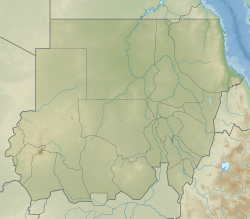| Location | Sudan |
|---|---|
| Coordinates | 15°45′N 32°33′E / 15.75°N 32.55°E |
| History | |
| Cultures | Early Khartoum |
| Associated with | Neolithic pastoralists |
| Site notes | |
| Excavation dates | 1972-2003 |
| Archaeologists | Lech Krzyżaniak, University of Warsaw |

Kadero is an African archaeological site located in Central Sudan, northeast of Khartoum, Sudan and east of the Nile River.[1][2] The site consists of burial grounds and two sand mounds around 1.5 meters in elevation, altogether encompassing around three hectares.[2][3] Excavations at the site were led by Lech Krzyżaniak at the University of Warsaw.[2] Kadero was occupied during the Neolithic period, dating to the years 5960 through 5030 B.P specifically, by pastoralists.[2][3] The inhabitants of Kadero left behind evidence of intensive pastoralism, which is the earliest evidence of such phenomena in the area.[3] Analysis of ceramics and stone artifacts have led archaeologists to consider the site as comparable to other early Neolithic sites in central Sudan, such as Ghaba and R12, placing the site in the early Khartoum culture.[2][3][4]
- ^ Krzyzaniak, Lech (1976). "The Archaeological Site of Kadero, Sudan". Current Anthropology. 17 (4): 762. doi:10.1086/201823. ISSN 0011-3204. JSTOR 2741286. S2CID 144379335.
- ^ a b c d e HerausgeberIn., Chłodnicki, Marek, HerausgeberIn. Kobusiewicz, Michał HerausgeberIn. Kröper, Karla. Kadero : the Lech Krzyżaniak excavations in the Sudan. ISBN 978-3-946654-27-8. OCLC 958023023.
{{cite book}}: CS1 maint: multiple names: authors list (link) - ^ a b c d Barakat, HalaNayel (1995). "Middle Holocene vegetation and human impact in central Sudan: charcoal from the neolithic site at Kadero". Vegetation History and Archaeobotany. 4 (2). doi:10.1007/bf00206918. ISSN 0939-6314. S2CID 128840141.
- ^ Zerboni, Andrea; Salvatori, Sandro; Vignola, Pietro; Mohammed, Abd el Rahman Ali; Usai, Donatella (2018). "The long-distance exchange of amazonite and increasing social complexity in the Sudanese Neolithic". Antiquity. 92 (365): 1195–1209. doi:10.15184/aqy.2018.196. hdl:2434/597736. ISSN 0003-598X. S2CID 165543217.

